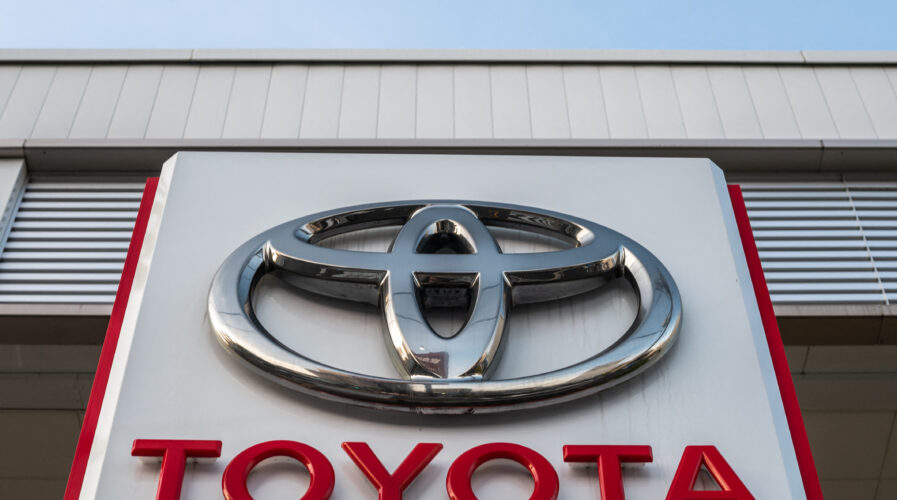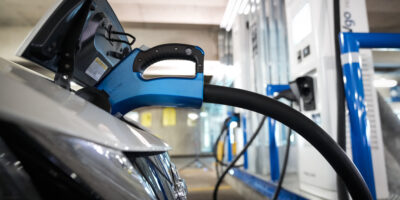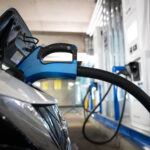
(Photo by Philip FONG / AFP)
Watch out Tata, Toyota has big plans in India
- Toyota is said to be planning to establish India as a manufacturing hub for EV parts to meet demand there as well as for export to Japan and some other ASEAN countries.
- The carmaker plans to start by producing e-drives or electric powertrain parts used by different EV types, including battery EVs, plug-in hybrids and other hybrid models.
The electric vehicle (EV) market in India today is in a fairly nascent stage but pundits reckon that the country is poised to emerge as one of the leading EV markets in the world. It is apparent, especially based on the rise in EV sales especially over the last two years. Noticing its potential, Japanese automaker Toyota Motor Corp has the intention to establish India as its manufacturing hub for EV parts.
In a recent interview with Reuters, Toyota Kirloskar Motors executive vice president Vikram Gulati said that the plan to make India a manufacturing hub is mainly to meet local demand as well as for export to Japan and some other ASEAN countries. In fact, just this week, the company announced that it will invest 48 billion rupees (US$621 million) in India to localize the supply chain for EVs, a part of its broader 2050 carbon-neutrality goals.
To be precise, Toyota’s local unit, Toyota Kirloskar Motor and Toyota Kirloskar Auto Parts signed a memorandum of understanding (MoU) with the southern state of Karnataka to invest 41 billion rupees, the group said in a statement last week. The rest of the investment will come from Toyota Industries Engine India.
Toyota is basically aligning its own green goals with India’s ambitions of becoming a manufacturing hub. “The aspiration is to make India the manufacturing hub for cleaner technologies. This is about creating the building blocks,” Gulati told Reuters. He however, did not specify the countries in ASEAN that Toyota would export to.
To top it off, Prime Minister Narendra Modi’s government is offering companies billions of dollars in incentives to build EVs and their parts locally as the switch to clean transport in India has been far slower than other countries such as China and the US. The growth over the last two years especially has been substantial as reflected by the local EV sales numbers.
In the period between April 2021 to March 2022, India’s EV sales grew by a staggering 257%, mainly driven by motorcycles, according to the Federation of Automobile Dealers Associations. Total EV retails reached 4,29,217 units in 2021-22, a rise of three-fold from 1,34,821 units in the financial year 2020-21, the industry body said. In a forecast by Crisil, it shows that Indian automakers could generate US$20 billion in revenue from EVs between now and fiscal year 2026. By 2040, 53% of new automobile sales in India will be electric, compared with 77% in China, BloombergNEF data shows.
“From a direct employment point of view, we are looking at around 3,500 new jobs,” Gulati told the Press Trust of India in an interview recently. “As the supply chain system builds, we expect much more to come in later.” The world’s biggest carmaker said in December it plans to invest a total of US$70 billion to electrify its automobiles by 2030. In India particularly, Toyota is more focused on launching its hybrid models first, which it believes are better suited to the country’s aim of reducing dependence on fossil fuels and carbon emissions.
The company also allocated around 2 trillion yen to develop EV batteries, a 30% increase from the target set in September 2021. The Japanese automaker also plans to ramp up battery production capacity to 280 gigawatt-hours by 2030, a 40% increase over previous plans.
Moreover, Toyota claims that it has secured enough supplies of battery raw materials including lithium to meet requirements until the end of this decade. The supplies are met through cooperation with trading house Toyota Tsusho.
READ MORE
- Strategies for Democratizing GenAI
- The criticality of endpoint management in cybersecurity and operations
- Ethical AI: The renewed importance of safeguarding data and customer privacy in Generative AI applications
- How Japan balances AI-driven opportunities with cybersecurity needs
- Deploying SASE: Benchmarking your approach


